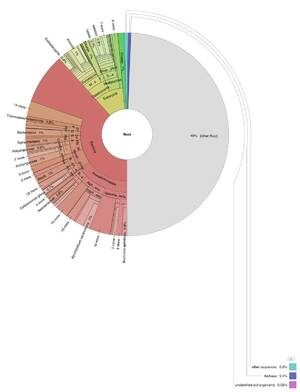DNA: Difference between revisions
mNo edit summary |
(Added new reference.) |
||
| Line 28: | Line 28: | ||
* [https://alien.wiki/images/7/7a/Abraxas_dna_report.pdf Abraxas Biosystems Report] | * [https://alien.wiki/images/7/7a/Abraxas_dna_report.pdf Abraxas Biosystems Report] | ||
* [https://alien.wiki/images/d/dd/Anon_genomic_analysis.pdf Genomic Analysis] | * [https://alien.wiki/images/d/dd/Anon_genomic_analysis.pdf Genomic Analysis] | ||
* [https://www.bioinformaticscro.com/blog/dna-evidence-for-alien-nazca-mummies-lacking/ The Bioinformatics CRO] | |||
{{#seo:|title=DNA Analysis}} | {{#seo:|title=DNA Analysis}} | ||
Revision as of 07:37, 11 March 2024

Introduction
In a recent study, seven samples were extracted from mummified remains for genetic analysis. These included three tissue samples and four DNA samples. Out of these, CEN4GEN-Ancient0002, CEN4GEN-Ancient0003, and CEN4GEN-Ancient0004 were found to be viable for advanced analysis.
Genetic Composition and DNA Fragment Analysis
CEN4GEN-Ancient0002 was notable for its 398 base pair fragment size. While this size is not exceptionally large, it was adequate for species identification purposes. Similarly, Ancient0003 and Ancient0004 contained 515 and 423 base pairs, respectively, indicating the presence of relatively small DNA fragments in these samples.
Comparative DNA Analysis
The research team embarked on a comprehensive comparison of these DNA samples against the human genome. This involved randomly selecting a quarter fragment from each sequence and mapping it using the latest human genome reference, GRCH38 release 93. The results were intriguing:
- Ancient0002 contained 14.2924% human DNA.
- Ancient0003 was predominantly human, with 97.6894% human DNA.
- Ancient0004 had 15.2589% human DNA.
These percentages represent the proportion of the randomly selected DNA quarter that matched the human genome reference.
As part of the control process, similar analysis was conducted on DNA confirmed to be 100% human. This confirmed the findings regarding Ancient0003, which not only matched human DNA with 95.07% accuracy but also was identified as male due to the presence of both X and Y chromosomes.
Further DNA Analysis
Ancient0002 and Ancient0004 were further compared against a comprehensive database of various organisms including bacteria, viruses, fungi, and animals. Despite this, a significant portion of their DNA (27% of Ancient0002 and 90% of Ancient0004) did not match any known DNA.
Further refinement using the NCBI nt database revealed that 54% of Ancient0002's and 76% of Ancient0004's DNA remained unclassified. However, this finding does not necessarily support the hypotheses of extraterrestrial origins. The DNA is terrestrial in nature, with unclassified segments likely belonging to as-yet unidentified microbes. These unclassified sequences show similarities to known terrestrial organisms, underscoring the need for more detailed research to fully comprehend these findings.